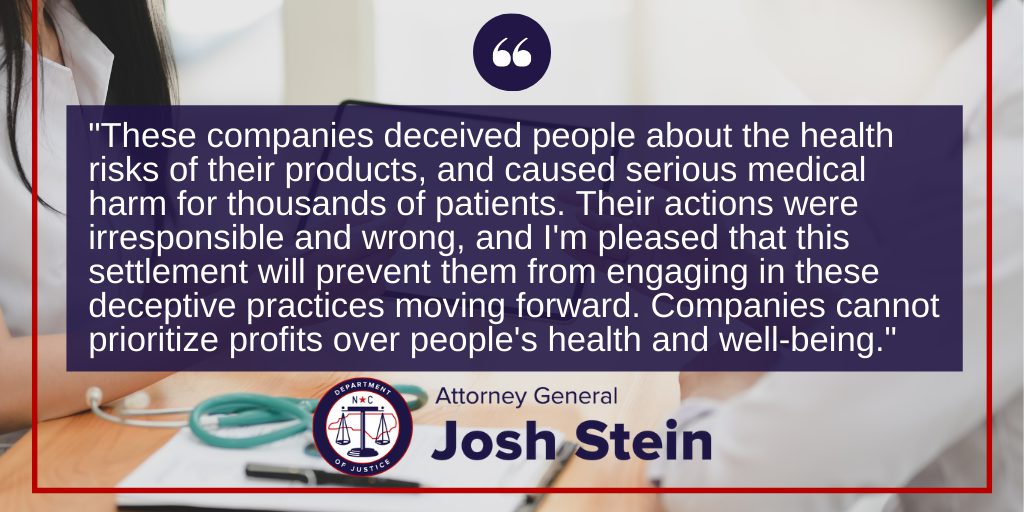
For Immediate Release:
Wednesday, September 30, 2020
Contact:
Laura Brewer (919) 716-6484
(RALEIGH) Attorney General Josh Stein announced a $60 million settlement with C.R. Bard, Inc. and its parent company Becton, Dickinson, and Company for the deceptive marketing of transvaginal surgical mesh devices.
“These companies deceived people about the health risks of their products, and caused serious medical harm for thousands of patients,” said Attorney General Josh Stein. “Their actions were irresponsible and wrong, and I’m pleased that this settlement will prevent them from engaging in these deceptive practices moving forward. Companies cannot prioritize profits over people’s health and well-being.”
Surgical mesh is a synthetic knitted or woven fabric that is permanently implanted in the pelvic floor through the vagina to treat pelvic organ prolapse and stress urinary incontinence. These are common conditions faced by women due to a weakening in their pelvic floor muscles caused by childbirth, age, and other factors. Millions of women were implanted with these devices, and thousands have claimed that they suffered serious complications resulting from these devices, including erosion of mesh through organs, pain during sexual intercourse, and voiding dysfunction.
Attorney General Stein and a coalition of 48 other attorneys general allege that C.R. Bard misrepresented or failed to adequately disclose the serious and life-altering risks of surgical mesh devices, including chronic pain, scarring and shrinking of bodily tissue, painful sexual relations, and recurring infections. Although C.R. Bard stopped selling transvaginal mesh, the settlement provides injunctive relief and requires both companies to adhere to certain injunctive terms if they re-enter the transvaginal mesh market.
Under the terms of the settlement, the companies must:
- Disclose and explain the complications of the transvaginal mesh to patients.
- Disclose sponsorship in clinical studies, data, and presentations.
- Register all clinical trials.
- Train individuals who sell or market the mesh to report all patient complaints and adverse events to the company.
- Ensure that their reporting of patient complaints meets FDA requirements.
Attorney General Stein is joined in this settlement by the Attorneys General of Alabama, Alaska, Arizona, Arkansas, California, Colorado, Connecticut, Delaware, District of Columbia, Florida, Georgia, Hawaii, Idaho, Illinois, Indiana, Iowa, Kansas, Kentucky, Louisiana, Maine, Maryland, Massachusetts, Michigan, Minnesota, Mississippi, Missouri, Montana, Nebraska, Nevada, New Hampshire, New Jersey, New Mexico, New York, North Dakota, Ohio, Oklahoma, Oregon, Pennsylvania, Rhode Island, South Carolina, South Dakota, Tennessee, Texas, Utah, Vermont, Virginia, Washington, and Wisconsin.
###
